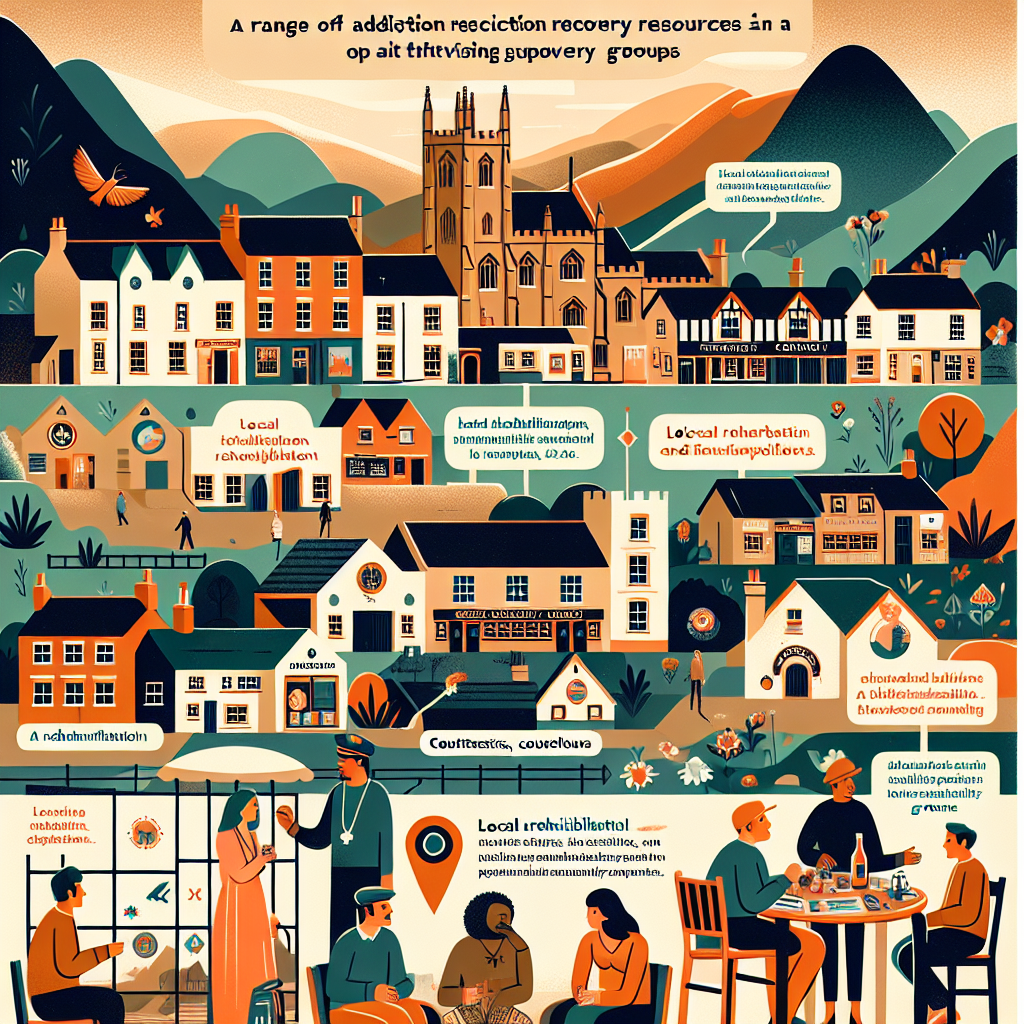-
Table of Contents

“Empowering holistic healing: Integrating addiction recovery with mental health support for lasting wellness.”
Introduction
Addiction recovery services play a crucial role in supporting individuals with co-occurring disorders, which refer to the simultaneous presence of a substance use disorder and a mental health condition. These services adopt an integrated treatment approach that addresses both issues concurrently, recognizing the complex interplay between addiction and mental health. By offering comprehensive assessments, personalized treatment plans, and a combination of therapeutic interventions such as cognitive-behavioral therapy, medication management, and peer support, addiction recovery services aim to improve overall well-being and promote long-term recovery. Additionally, these services often provide education, resources, and support for families, helping to create a stable and understanding environment that fosters recovery. Through a holistic and coordinated effort, addiction recovery services strive to empower individuals with co-occurring disorders to achieve and maintain a healthier, more balanced life.
Comprehensive Care: How Addiction Recovery Services Address Co-Occurring Disorders
Addiction recovery services play a crucial role in supporting individuals with co-occurring disorders, which are conditions where a person experiences both a substance use disorder and a mental health disorder simultaneously. These dual diagnoses present unique challenges, as the interplay between mental health issues and addiction can complicate treatment and recovery. However, comprehensive care approaches have been developed to address these complexities, offering hope and a path to recovery for those affected.
One of the primary ways addiction recovery services support individuals with co-occurring disorders is through integrated treatment. This approach involves coordinating care for both the substance use disorder and the mental health condition concurrently, rather than treating them as separate issues. By addressing both conditions simultaneously, integrated treatment helps to ensure that neither disorder is neglected, which is crucial for effective recovery. For instance, a person with depression and alcohol addiction might receive therapy for their depression while also participating in a substance abuse program, allowing for a more holistic approach to their recovery.
Moreover, addiction recovery services often employ a multidisciplinary team of professionals, including psychiatrists, psychologists, social workers, and addiction specialists. This team-based approach ensures that individuals receive comprehensive care tailored to their specific needs. Each professional brings their expertise to the table, creating a well-rounded support system that can address the various facets of co-occurring disorders. For example, a psychiatrist might manage medication for a mental health condition, while a psychologist provides therapy, and an addiction specialist offers strategies for overcoming substance use.
In addition to professional support, peer support plays a significant role in the recovery process. Many addiction recovery services incorporate peer support groups, where individuals can share their experiences and offer mutual encouragement. These groups provide a sense of community and understanding, which can be incredibly empowering for those struggling with co-occurring disorders. Knowing that others have faced similar challenges and have found a way to overcome them can inspire hope and motivate individuals to stay committed to their recovery journey.
Furthermore, addiction recovery services often emphasize the importance of developing coping skills and strategies to manage both mental health symptoms and cravings for substances. Cognitive-behavioral therapy (CBT) is one such evidence-based approach that helps individuals identify and change negative thought patterns and behaviors. By learning healthier ways to cope with stress, anxiety, or depression, individuals can reduce their reliance on substances as a form of self-medication. This dual focus on mental health and addiction equips individuals with the tools they need to navigate the complexities of their conditions.
Another critical aspect of comprehensive care is the provision of aftercare and ongoing support. Recovery is not a one-time event but a continuous process that requires sustained effort and support. Addiction recovery services often offer aftercare programs, such as continued therapy, support groups, and relapse prevention planning, to help individuals maintain their progress and prevent relapse. These ongoing services ensure that individuals have access to the resources and support they need as they transition back into their daily lives.
In conclusion, addiction recovery services provide invaluable support to individuals with co-occurring disorders through integrated treatment, multidisciplinary care, peer support, skill development, and ongoing aftercare. By addressing both substance use and mental health issues concurrently, these services offer a comprehensive approach that fosters lasting recovery. The journey may be challenging, but with the right support and resources, individuals can overcome their co-occurring disorders and lead fulfilling, healthy lives.
Integrated Treatment Approaches in Addiction Recovery for Co-Occurring Disorders
Addiction recovery services play a crucial role in supporting individuals with co-occurring disorders, which are conditions where a person experiences both a mental health disorder and a substance use disorder simultaneously. These dual diagnoses present unique challenges, as the symptoms of one disorder can often exacerbate the symptoms of the other. Therefore, integrated treatment approaches are essential in providing comprehensive care that addresses both aspects of an individual’s health.
One of the primary ways addiction recovery services support people with co-occurring disorders is through the implementation of integrated treatment plans. These plans are designed to treat both the mental health disorder and the substance use disorder concurrently, rather than addressing them separately. This holistic approach ensures that the treatment of one condition does not inadvertently worsen the other. For instance, a person with depression and alcohol addiction might receive therapy that addresses both their depressive symptoms and their reliance on alcohol as a coping mechanism.
Moreover, addiction recovery services often employ a multidisciplinary team of professionals, including psychiatrists, psychologists, social workers, and addiction specialists. This team collaborates to create a personalized treatment plan that meets the unique needs of each individual. By working together, these professionals can provide a more nuanced and effective treatment strategy. For example, a psychiatrist might prescribe medication to manage anxiety, while a psychologist provides cognitive-behavioral therapy to help the individual develop healthier coping strategies.
In addition to professional support, peer support groups play a significant role in the recovery process for individuals with co-occurring disorders. These groups offer a sense of community and understanding, as members share similar experiences and challenges. Participating in peer support groups can reduce feelings of isolation and provide encouragement from others who have successfully navigated similar paths. This sense of camaraderie can be incredibly motivating and can help individuals stay committed to their recovery journey.
Furthermore, addiction recovery services often incorporate educational components to help individuals understand the nature of their disorders and the interplay between them. Knowledge is empowering, and by learning about their conditions, individuals can better recognize triggers, develop coping mechanisms, and make informed decisions about their treatment. Education also extends to family members, who can play a supportive role in the recovery process. By understanding the complexities of co-occurring disorders, families can provide more effective support and create a more conducive environment for recovery.
Another critical aspect of integrated treatment is the focus on long-term recovery and relapse prevention. Addiction recovery services emphasize the importance of ongoing support and aftercare, recognizing that recovery is a lifelong journey. This might include continued therapy, regular check-ins with healthcare providers, and participation in support groups. By maintaining a network of support, individuals are better equipped to handle setbacks and continue progressing in their recovery.
In conclusion, addiction recovery services provide invaluable support to individuals with co-occurring disorders through integrated treatment approaches. By addressing both mental health and substance use disorders simultaneously, employing a multidisciplinary team, fostering peer support, offering education, and focusing on long-term recovery, these services create a comprehensive and effective framework for healing. The journey to recovery is undoubtedly challenging, but with the right support and resources, individuals with co-occurring disorders can achieve a healthier, more fulfilling life.
Q&A
1. **Question:** How do addiction recovery services address the needs of individuals with co-occurring disorders?
**Answer:** Addiction recovery services often provide integrated treatment plans that address both substance use disorders and mental health conditions simultaneously, ensuring that both issues are treated in a coordinated manner.
2. **Question:** What specific therapies are commonly used in addiction recovery services for people with co-occurring disorders?
**Answer:** Common therapies include Cognitive Behavioral Therapy (CBT), Dialectical Behavior Therapy (DBT), and medication management, all tailored to address both the addiction and the mental health disorder.
Conclusion
Addiction recovery services support people with co-occurring disorders by providing integrated treatment plans that address both substance use and mental health issues simultaneously. These services often include a combination of medical care, psychotherapy, medication management, and peer support, tailored to meet the unique needs of each individual. By addressing both conditions concurrently, these programs aim to improve overall outcomes, reduce the risk of relapse, and enhance the quality of life for individuals struggling with co-occurring disorders.



